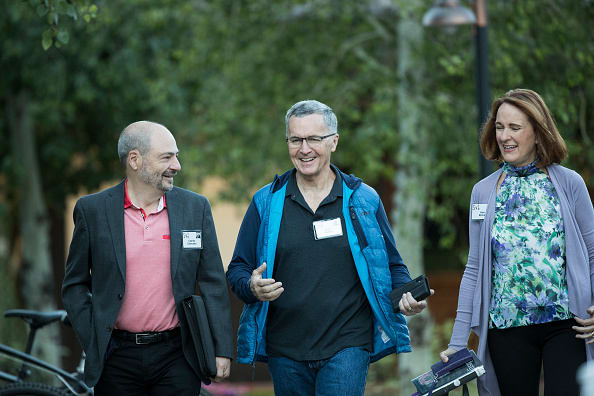
SUN VALLEY, ID – JULY 11: (L-R) Charles Giancarlo, chief executive officer of Pure Storage, Robert Richer, former deputy director of operations of the U.S. Central Intelligence Agency, and his wife Kim Richer arrive for a morning session of the annual Allen & Company Sun Valley Conference, July 11, 2018 in Sun Valley, Idaho. Every July, some of the world’s most wealthy and powerful businesspeople from the media, finance, technology and political spheres converge at the Sun Valley Resort for the exclusive weeklong conference. (Photo by Drew Angerer/Getty Images)
Drew Angerer
In late March Pure Storage disclosed in an annual report that its CEO, Charlie Giancarlo, had tested positive for coronavirus.
Almost no one seemed to notice.
“There was one person that called me afterward saying, ‘It’s amazing the kinds of things you pick up in a 10-K,” Giancarlo told CNBC in an interview on Friday. A day earlier, during a conference call with analysts, he mentioned he had contracted the virus.
Giancarlo is a former Cisco executive who replaced Scott Dietzen as Pure’s CEO in 2017, almost two years after Pure Storage’s debut on the New York Stock Exchange. Pure, which sells products that companies use to store data, still hasn’t turned a profit since he arrived, but revenue has continued to grow as subscription services, including those that draw on cloud-based storage, have become a larger part of the business.
A trip to Spain
Giancarlo thinks he caught the virus while traveling in Spain on March 10. He flew to London and then returned to California later that week. Friends visited for dinner that weekend.
“I decided to pretty much isolate myself following protocol, not touching anybody, staying 6 feet apart,” he said.
On Saturday night he woke up with night sweats. The next day, he kept himself in a bedroom separate from his family. He monitored his temperature with an oximeter on a finger.
On Monday, he worked and took lots of Advil and Tylenol, but he didn’t go into work. That was the day local officials directed people to shelter in place. Work life instantly changed for employees of Pure and other technology companies around the San Francisco Bay Area.
Over the next few days, Giancarlo kept working, staying in touch with customers and various internal teams on the phone and through Zoom. He ran a fever, got chills, felt fatigued and had backaches. He did not cough, sneeze or feel a shortness of breath, he said.
That week, he was tested for coronavirus twice, and each time the result was negative. His doctor checked him for tuberculosis and other ailments to figure out if he had something other than the virus.
At one point, he called his assistant and said he noticed that back-to-back meetings were coming up, and he simply didn’t have the energy for them.
After that, he and the other top leaders made the decision to mention his illness in the company’s annual report.
“I asked my senior team, ‘In the next couple of days I don’t know that I can be full-time. You may need to cover for me,'” he said. By that point, he said, his health was deteriorating.
He took a third test. This time, it came back positive. That’s around the time his fever broke.
Giancarlo said he now knows how bad it can be to have Covid-19. His perspective has also been shaped relatives in the medical field who have been in harm’s way, he said.
A slow and cautious return
Pure’s facilities have an open-office configuration — something Giancarlo never liked because it reminded him of a sweatshop. That layout will be rearranged. Only a few people will be able to work in the same space at a time initially, he said.
He knows different parts of the U.S. are going about reopening in different ways. Pure will be on the slower and more cautious side of the spectrum, he said. Some employees have gotten cabin fever, and some managers are feeling stressed with heavier workloads, but many of Pure’s employees have grown accustomed to distributed work, Giancarlo said. He found that he personally was more productive than usual while working at home.
“It’s just more time that I can work,” he said.
On Thursday’s call he told analysts that the company’s salespeople have actually been more productive — they no longer have to travel for meetings with customers and prospects. Less travel also helped the company trim its operating losses.
The company’s results exceeded analysts’ expectations for its fiscal first quarter on Thursday, although, like some other companies in this earnings season, it opted not to provide guidance for the current quarter or the full fiscal year. Shares rose almost 5% during Friday’s trading session.
As Google recently said it would do, Pure offered employees money to buy equipment that can help them work from their homes. Pure has also held “parent panels” for employees and offered medical and mental health support, Giancarlo said.
Executives from other companies have reached out to him to learn about his experience.
“A personal story goes a very long way to building relationships,” he said.

